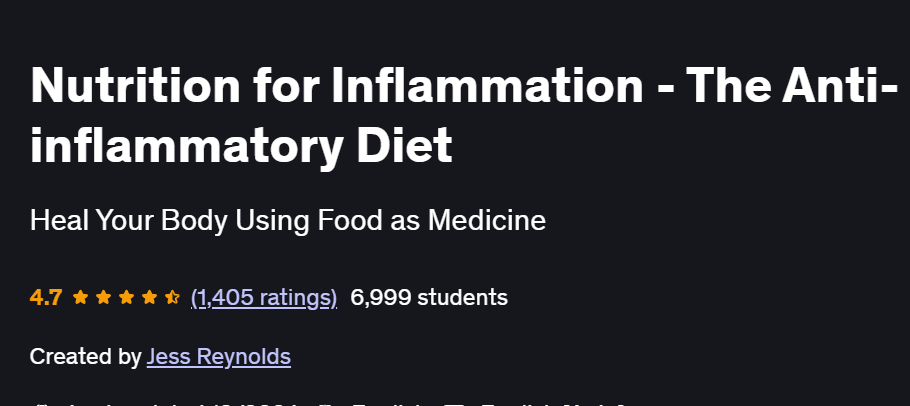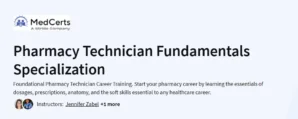What you will learn in Nutrition for Inflammation – The Anti-inflammatory Diet Course
Understand the relationship between inflammation and health conditions, such as arthritis, heart disease, and diabetes.
Learn how nutrition can be used to reduce inflammation and promote overall health.
Study anti-inflammatory foods, nutrients, and supplements that can help manage and prevent inflammation.
Explore how to create a balanced diet plan that supports immune function and reduces chronic inflammation.
Gain practical tips for incorporating anti-inflammatory foods into your daily meals and lifestyle.
Program Overview
Introduction to Inflammation and Its Impact
⏳ 1-2 hours
Learn about the different types of inflammation, including acute and chronic inflammation.
Study the causes and effects of inflammation on the body, including its role in disease development.
Understand how lifestyle factors, such as diet, stress, and sleep, influence inflammation levels.
The Role of Nutrition in Inflammation
⏳ 2-3 hours
- Learn how certain foods and nutrients either contribute to or reduce inflammation.
- Study the science behind anti-inflammatory diets and their effects on the immune system.
- Explore how to choose the right foods to support inflammation management, including fruits, vegetables, whole grains, and healthy fats.
Key Anti-Inflammatory Foods
⏳ 3-4 hours
- Study specific foods that are known to reduce inflammation, such as turmeric, ginger, berries, and leafy greens.
- Learn about the benefits of omega-3 fatty acids and antioxidants in reducing inflammation.
- Explore the impact of probiotics, vitamins, and minerals on gut health and inflammation.
Nutritional Strategies for Managing Inflammation
⏳ 3-4 hours
- Learn how to design an anti-inflammatory diet that aligns with your health goals.
- Study meal planning tips for incorporating anti-inflammatory foods into your daily routine.
- Understand the importance of balancing macronutrients and micronutrients to manage inflammation levels effectively.
Supplements and Lifestyle Factors for Inflammation
⏳ 2-3 hours
Explore how certain supplements, such as fish oil, curcumin, and vitamin D, can help reduce inflammation.
Learn about lifestyle changes that can complement an anti-inflammatory diet, including stress reduction, exercise, and sleep improvement.
Study how to manage other factors that influence inflammation, such as environmental toxins and smoking.
Practical Tips for Implementing Anti-Inflammatory Nutrition
⏳ 2-3 hours
- Learn how to integrate anti-inflammatory foods into everyday meals and snacks.
- Study the benefits of preparing homemade meals versus relying on processed foods.
- Explore simple cooking methods and recipes that promote anti-inflammatory eating.
Final Project: Creating an Anti-Inflammatory Meal Plan
⏳2-3 hours
- Apply what you’ve learned by creating a one-week anti-inflammatory meal plan for yourself or a client.
- Include a variety of anti-inflammatory foods, and ensure balanced nutrition throughout the plan.
- Receive feedback and suggestions for refining your meal plan to better manage inflammation.
Get certificate
Job Outlook
Nutritionists, dietitians, and health coaches who specialize in inflammation management and anti-inflammatory diets are in demand across healthcare settings, wellness centers, and private practice.
Professionals with expertise in anti-inflammatory nutrition can earn between $40K and $70K annually, with potential for higher earnings through private consultations, workshops, and online programs.
Many health professionals also contribute to publications, content creation, and educational platforms.
Specification: Nutrition for Inflammation – The Anti-inflammatory Diet
|





